新课标人教版高中英语必修五unit4 using language 教案
- 格式:doc
- 大小:28.00 KB
- 文档页数:3

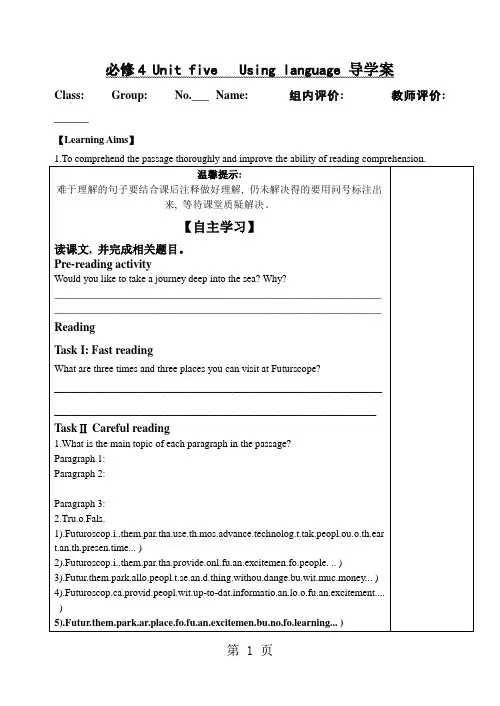
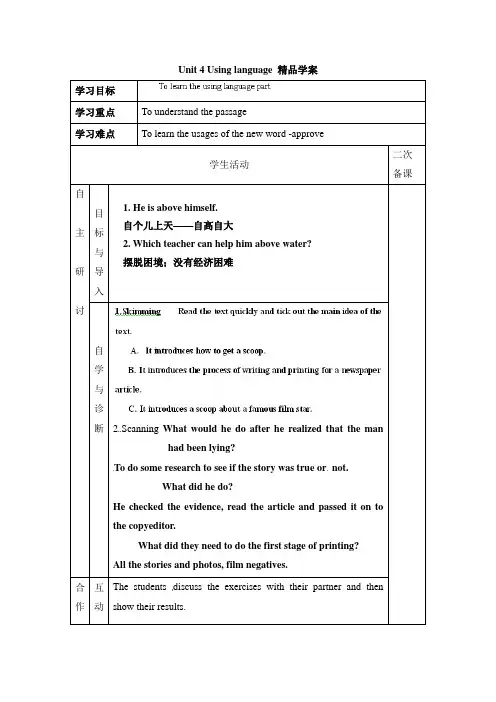
Unit 4 Using language 精品学案学习目标学习重点To understand the passage学习难点To learn the usages of the new word -approve学生活动二次备课自主研讨目标与导入1. He is above himself.自个儿上天——自高自大2. Which teacher can help him above water?摆脱困境;没有经济困难自学与诊断 2.Scanning What would he do after he realized that the manhad been lying?To do some research to see if the story was true or not.What did he do?He checked the evidence, read the article and passed it on to the copyeditor.What did they need to do the first stage of printing?All the stories and photos, film negatives.合作互动The students discuss the exercises with their partner and then show their results.互动精讲与点拨1.We need it in this edition to be ahead of the othernewspapers.ahead of 在前面,先于,胜于Do not go too far ahead of me.We're about 60 years ahead of you.The Italian team is 3 points ahead of the English one. 2. Last of all, the chief editor read itand approved it.approve of“赞成”、“认可” “满意”、“同意”approve“批准”、“通过”I do not approve of your going out with him.The company president approved the building plans.检测与评价达标与检测Fill in the blanksThe primary source is __________ because _________.Ithink _____________________________ will have more opinions than facts because _________________.Keys:the Gallic Warsit was written at the timePlutarch’s Life of Julius Caesar and Shakespeare’s play about Julius Caesarthey were written long after the events happened。
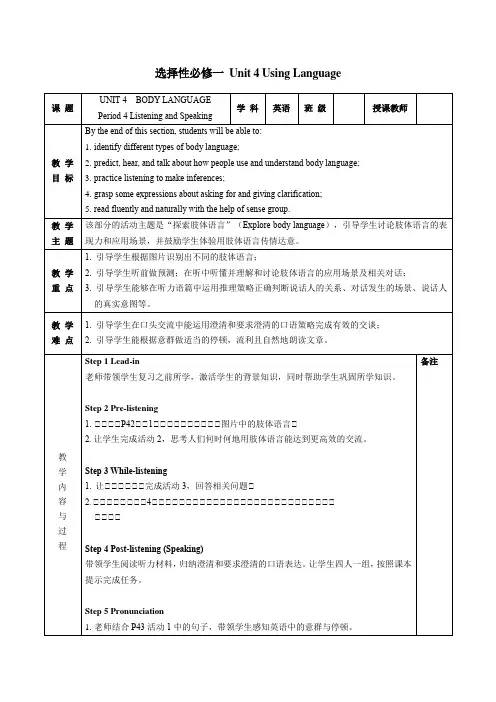
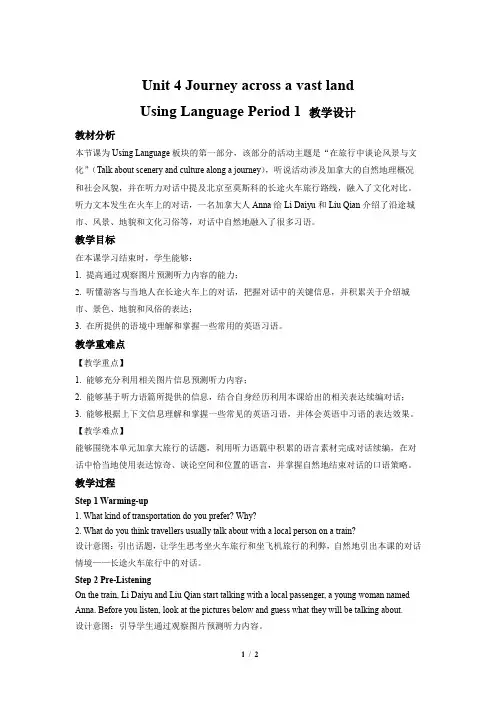
Unit 4 Journey across a vast landUsing Language Period 1 教学设计教材分析本节课为Using Language板块的第一部分,该部分的活动主题是“在旅行中谈论风景与文化”(Talk about scenery and culture along a journey),听说活动涉及加拿大的自然地理概况和社会风貌,并在听力对话中提及北京至莫斯科的长途火车旅行路线,融入了文化对比。
听力文本发生在火车上的对话,一名加拿大人Anna给Li Daiyu和Liu Qian介绍了沿途城市、风景、地貌和文化习俗等,对话中自然地融入了很多习语。
教学目标在本课学习结束时,学生能够:1. 提高通过观察图片预测听力内容的能力;2. 听懂游客与当地人在长途火车上的对话,把握对话中的关键信息,并积累关于介绍城市、景色、地貌和风俗的表达;3. 在所提供的语境中理解和掌握一些常用的英语习语。
教学重难点【教学重点】1. 能够充分利用相关图片信息预测听力内容;2. 能够基于听力语篇所提供的信息,结合自身经历利用本课给出的相关表达续编对话;3. 能够根据上下文信息理解和掌握一些常见的英语习语,并体会英语中习语的表达效果。
【教学难点】能够围绕本单元加拿大旅行的话题,利用听力语篇中积累的语言素材完成对话续编,在对话中恰当地使用表达惊奇、谈论空间和位置的语言,并掌握自然地结束对话的口语策略。
教学过程Step 1 Warming-up1. What kind of transportation do you prefer? Why?2. What do you think travellers usually talk about with a local person on a train?设计意图:引出话题,让学生思考坐火车旅行和坐飞机旅行的利弊,自然地引出本课的对话情境——长途火车旅行中的对话。
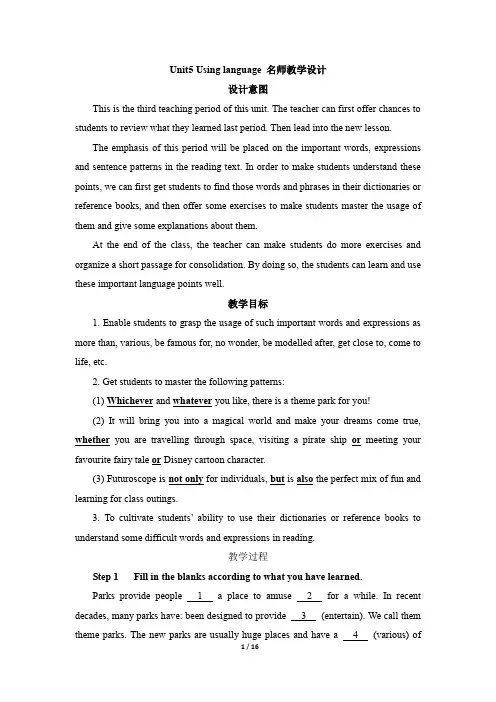
Unit5 Using language 名师教学设计设计意图This is the third teaching period of this unit. The teacher can first offer chances to students to review what they learned last period. Then lead into the new lesson.The emphasis of this period will be placed on the important words, expressions and sentence patterns in the reading text. In order to make students understand these points, we can first get students to find those words and phrases in their dictionaries or reference books, and then offer some exercises to make students master the usage of them and give some explanations about them.At the end of the class, the teacher can make students do more exercises and organize a short passage for consolidation. By doing so, the students can learn and use these important language points well.教学目标1. Enable students to grasp the usage of such important words and expressions as more than, various, be famous for, no wonder, be modelled after, get close to, come to life, etc.2. Get students to master the following patterns:(1) Whichever and whatever you like, there is a theme park for you!(2) It will bring you into a magical world and make your dreams come true, whether you are travelling through space, visiting a pirate ship or meeting your favourite fairy tale or Disney cartoon character.(3) Futuroscope is not only for individuals, but is also the perfect mix of fun and learning for class outings.3. To cultivate students’ ability to use their dictionaries or reference books to understand some difficult words and expressions in reading.教学过程Step 1 Fill in the blanks according to what you have learned.Parks provide people 1 a place to amuse 2 for a while. In recent decades, many parks have: been designed to provide 3 (entertain). We call them theme parks. The new parks are usually huge places and have a 4 (various) ofthings to see and do. Theme parks have a certain idea — a certain theme — that the whole parks are based 5 . For example, a sport theme park will offer visitors sports to play or watch; a history 6 culture theme park will let us see 7 our ancestors dressed, worked or 8 (live). The 9 (old) theme park in the world is Disneyland. It seemed like a place of fantasy. Besides these, we have the marine or ocean parks, which 10 a lot of visitors.Suggested answers: 1. with 2. themselves 3. entertainment 4. variety 5. on 6. or 7. how 8. lived 9. oldest 10. attractStep 2 Words and expressions to learn.(设计意图:让学生在训练中掌握本单元的重点词汇和短语的意义以及在不同语境中的具体运用。
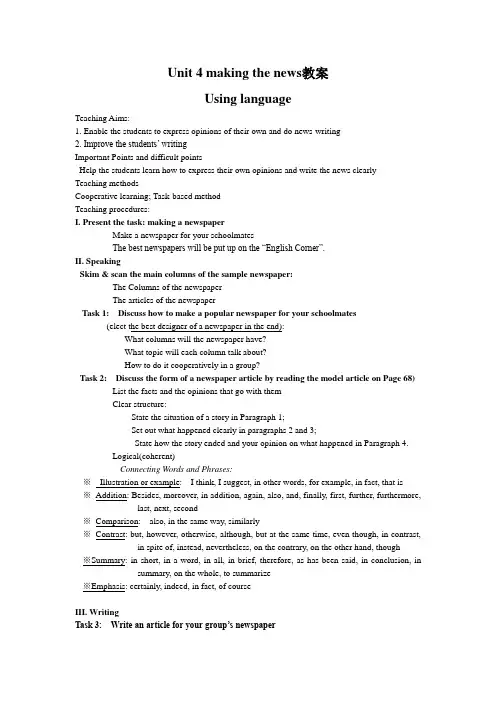
Unit 4 making the news教案Using languageTeaching Aims:1. Enable the students to express opinions of their own and do news-writing2. Improve the students’ writingImportant Points and difficult pointsHelp the students learn how to express their own opinions and write the news clearlyTeaching methodsCooperative learning; Task-based methodTeaching procedures:I. Present the task: making a newspaperMake a newspaper for your schoolmatesThe best newspapers will be put up on the “English Corner”.II. SpeakingSkim & scan the main columns of the sample newspaper:The Columns of the newspaperThe articles of the newspaperTask 1: Discuss how to make a popular newspaper for your schoolmates(elect the best designer of a newspaper in the end):What columns will the newspaper have?What topic will each column talk about?How to do it cooperatively in a group?Task 2: Discuss the form of a newspaper article by reading the model article on Page 68) List the facts and the opinions that go with themClear structure:State the situation of a story in Paragraph 1;Set out what happened clearly in paragraphs 2 and 3;State how the story ended and your opinion on what happened in Paragraph 4.Logical(coherent)Connecting Words and Phrases:※Illustration or example: I think, I suggest, in other words, for example, in fact, that is※Addition: Besides, moreover, in addition, again, also, and, finally, first, further, furthermore, last, next, second※Comparison: also, in the same way, similarly※Contrast: but, however, otherwise, although, but at the same time, even though, in contrast, in spite of, instead, nevertheless, on the contrary, on the other hand, though※Summary: in short, in a word, in all, in brief, therefore, as has been said, in conclusion, in summary, on the whole, to summarize※Emphasis: certainly, indeed, in fact, of courseIII. WritingTask 3: Write an article for your group’s newspaperTask 5: Evaluation of Your Work in ClassThe best co-operating groupsThe best editorsThe best writersTask 6I. Elaboration & prediction: get the students to predict what they will listen to and elaborate the topic to their known knowledge.Task 1: Go over Ex1 on Page 31 and guess what they will listen to on the tape.(group discussion)II. ListeningTask 2: Listen and circle the correct summary of the listening passage.This is about a young man who is refused an interview with Liu Ming.This is about a young man who is trying to arrange in interview with Liu Ming.This is about a young man who wants to ask Liu Ming about how to work abroad.Task 3: Listen to the tape again and answer questions on Page 32.Task 4: Listen to the tape again and try to note down the dialogue (pair work)Task5: Role-play the dialogue and elect the best actors (the most similar to the original dialogue)III. Speaking and ListeningDiscuss the phrase that may be used in making appointments (input)Shall we make an appointment? How about…?When are you free? When do you think is convenient for you?Is it possible to…? I shall be busy at… and… but I can be free at…Where is the best place? Maybe we can meet at…Task 7: Make an appointment according to the situation in Ex3 on Page 32Task 8: Listen to the tape and do Ex 1 and Ex2 (LISTENING)) on Page 62.IV. AssignmentFinish making the newspaper in a group.。
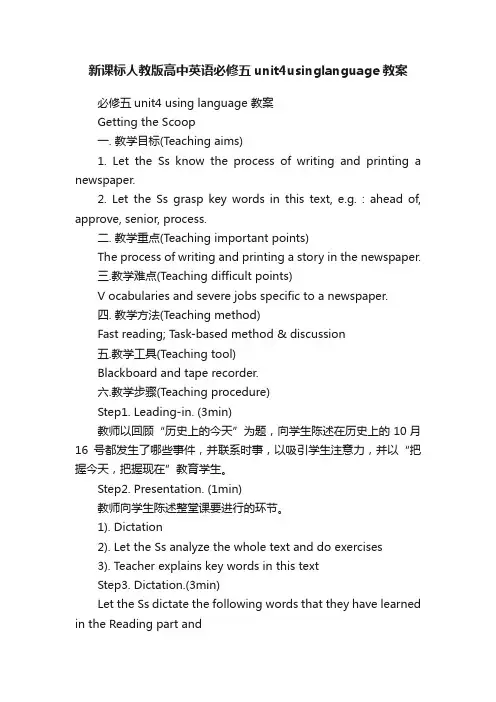
新课标人教版高中英语必修五unit4usinglanguage教案必修五unit4 using language 教案Getting the Scoop一. 教学目标(Teaching aims)1. Let the Ss know the process of writing and printing a newspaper.2. Let the Ss grasp key words in this text, e.g. : ahead of, approve, senior, process.二. 教学重点(Teaching important points)The process of writing and printing a story in the newspaper.三.教学难点(Teaching difficult points)V ocabularies and severe jobs specific to a newspaper.四. 教学方法(Teaching method)Fast reading; Task-based method & discussion五.教学工具(Teaching tool)Blackboard and tape recorder.六.教学步骤(Teaching procedure)Step1. Leading-in. (3min)教师以回顾“历史上的今天”为题,向学生陈述在历史上的10月16号都发生了哪些事件,并联系时事,以吸引学生注意力,并以“把握今天,把握现在”教育学生。
Step2. Presentation. (1min)教师向学生陈述整堂课要进行的环节。
1). Dictation2). Let the Ss analyze the whole text and do exercises3). Teacher explains key words in this textStep3. Dictation.(3min)Let the Ss dictate the following words that they have learned in the Reading part andchoose tow Ss dictate on the blackboard.delighted; admirable; assistant; concentrate on; inform; deadline; depend on; accuseof; dilemma; so as toAfter dictation, teacher checks the words that the two Ss wrote on the blackboard.Step4. Fast reading. (20min)1. Let the Ss listen to the tape to find out the main idea of this text. Teacher chooses one student to answer this question and complete the answer.2. Let the Ss read the first two para. quickly and ask one student to make the three steps on the blackboard in right order. After that,teacher checks the answer.3. Let the Ss read the third para. til the first sentence of the fouth papa. and ask one student to do the match on the blackboard. After that,teacher checks the answer.4. Let the Ss read the rest part of the text and ask one student to complete the chart on the blackboard. After that,teacher checks the answer.Step5. V ocabularies. (15min)1. Ahead of 在……之前;胜过;强于常用:be ahead of sth. ahead of time 提早;提前go ahead 前进;继续干;说下去(常用于口语)E.g. : ―May I open the window?―Go ahead! (表示赞同对方的观点)2. Senior 高级的,高年级的;年长的(联系junior一同学习)常用:be senior /junior to 比…年长∕年幼的E.g.: He is senior /junior to me by two years.他比我大∕小两岁Senior high school 高中Junior high school 初中※senior/junior 无比较级,不与than 搭配使用3. Approve 赞成;同意;认可;批准常用:approve sth. 批准某事E.g.: The leader approved our plan.领导批准了我们的计划。
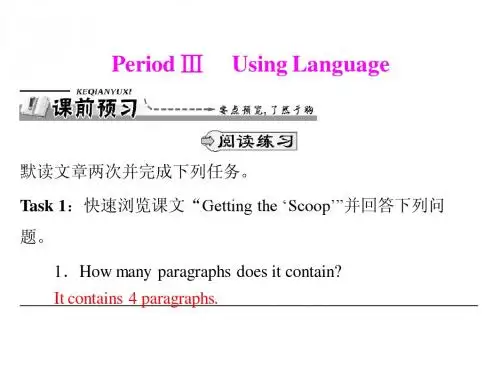
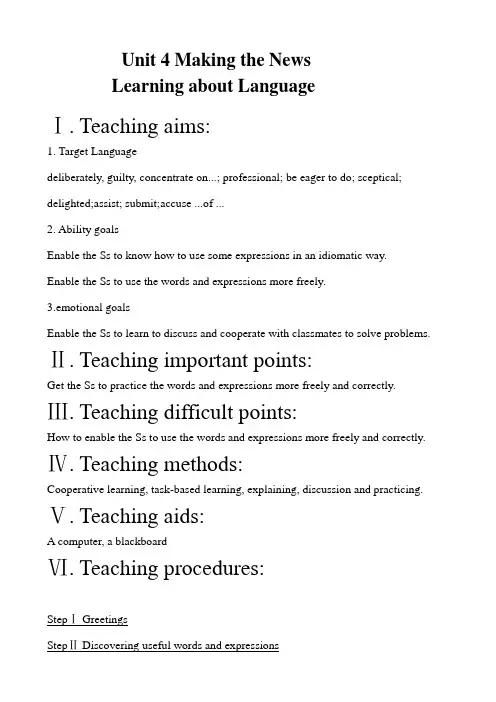
Unit 4 Making the NewsLearning about LanguageⅠ. Teaching aims:1. Target Languagedeliberately, guilty, concentrate on...; professional; be eager to do; sceptical; delighted;assist; submit;accuse ...of ...2. Ability goalsEnable the Ss to know how to use some expressions in an idiomatic way. Enable the Ss to use the words and expressions more freely.3.emotional goalsEnable the Ss to learn to discuss and cooperate with classmates to solve problems. Ⅱ. Teaching important points:Get the Ss to practice the words and expressions more freely and correctly.Ⅲ. Teaching difficult points:How to enable the Ss to use the words and expressions more freely and correctly.Ⅳ. Teaching methods:Cooperative learning, task-based learning, explaining, discussion and practicing.Ⅴ. Teaching aids:A computer, a blackboardⅥ. Teaching procedures:StepⅠ GreetingsStepⅡ Discovering useful words and expressionsEX1:1. Show some pictures of idiomatic expressions and ask students to guess the meanings.Examples: Polishing the apple is dangerous.A Limao is good at talking horse.Which teacher can help him above water?2.Give Ss directions that they should find the idiomatic expressions used in the text to match with the expressions given in the chart. Then check and make some necessary explanation.Ex2: 1.Ask the Ss to finish Exercise 2 in pairs and then check the answer and explain some related words and expressions if needed.全神贯注于;专心于:concentrate on(doing)sth.be absorbed inbe lost inbe devoted toput one’s heart intofocus on指控某人做某事:accuse sb of sth.accuse sb of doing sth.charge sb with sth2. Review the words we used in the text:deliberately--- by accidentguilty----don’t do anything wrongconcentrate on----don’t get absorbed inprofessional ---- untrainedbe eager to do ---- be not interested inlight ---- thoroughdefend..of…---- accuse…of…acquire --- loseEx3:1. Review these words and explain them if necessary.2.ask students to discuss in groups and then check the answer.My first assignment was as a(an)1.assistant to a famous fashion 2. photographer, who was going to take photos of a model by the name of Wang Li. I felt 3.delighted as I was to 4.assist him. We had not gone far when our 5.editor called. “Be sure to finish your task before the 6 .deadline.”My 7.colleague laughed. “He wants to concentrate on the time because I’ve missed deadlines before,”he said to me. When we arrived, we found Wang Li was extremely charming. She explained that as an 8.amateur photographer. she expected all the photographs to be 9. submitted to her before they were10.published. This was 11.dilemma as there was little time before the deadline. My colleague 12.assessd the situation and announced that as this was 13. unusual he would have to refer the matter to his editor.14. Meanwhile he would get ready. At first Wang Li was 15. sceptical, but when our editor rang to inform her that she would have her photographs before they were published, she was satisfied.Step Ⅲ:运用:根据汉语意思完成英语句子。
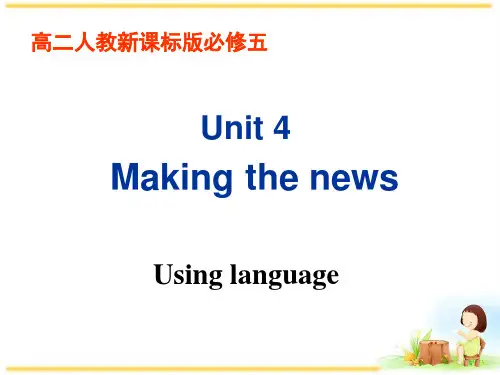
Period Three Using Language1edition n.版(本);版次;(报纸或杂志的)一期We need it in this edition to be ahead of the other newspapers.我们这一版就要用,这样我们就抢在其他报纸的前面了。
(回归课本)用法点拨The dictionary is now in its sixth edition.本词典现在是第六版。
This remark did not appear in revised edition of the work.这一评述在作品的修订版中没有出现。
归纳拓展edit v.编辑;校订;做(报纸、杂志的)主编editor n.主编;编辑软件佳句背诵(1)He had an entry in the 1993 edition of the Guinness Book of Records.他被收录到1993年版的《吉尼斯世界大全》中。
(2)Her original text has been heavily edited.她的原文已被大量地修改了。
2accurate adj.精确的;正确的He would have to be_accurate.他必须做到准确无误。
(回归课本)用法点拨We need to get some more accurate information.我们需要得到一些更准确的情报。
He is very accurate in his calculations.他的计算非常准确。
归纳拓展accurately ad v.准确地;精确地accuracy n.准确性;精确性inaccurate adj.不准确的完成句子(1)The accuracy_of_the_report(报道的准确性)cannot be checked.(2)Would it be_more_accurate(更为准确)to say that the plan failed?3senior adj.年长的;高年级的;高级的The first person who saw his article was a_senior editor from his department.第一个看到这篇文章的人是他们部里的一位编审。
2024年英语必修5人教版新课标Unit4 教案5份一、教学内容二、教学目标1. 了解并掌握与未来相关的词汇、短语和句型;2. 能够运用所学知识进行情景对话,表达自己对未来职业的期望;3. 培养学生的创新意识和职业规划意识。
三、教学难点与重点重点:与未来相关的词汇、短语和句型的掌握,情景对话的运用。
难点:词汇、短语的正确运用,句型的熟练运用。
四、教具与学具准备教具:PPT、黑板、粉笔、教学卡片等。
学具:课本、笔记本、练习本等。
五、教学过程1. 导入:通过展示未来交通工具和职业的图片,引导学生讨论对未来生活的期待,激发学生学习兴趣。
2. 新课内容呈现:a. 教师带领学生一起学习Chapter 1 The Future of Transportation,讲解重点词汇和句型;b. 学生进行小组讨论,运用所学词汇和句型进行情景对话;c. 教师展示Chapter 2 My Future Career,引导学生学习相关词汇和句型;d. 学生进行个人陈述,表达自己的未来职业规划。
3. 例题讲解:针对本节课的重点内容,讲解典型例题,帮助学生巩固所学。
4. 随堂练习:学生完成教师布置的练习题,巩固所学知识。
六、板书设计板书分为两部分:1. Chapter 1 The Future of Transportation:a. 重点词汇;b. 重点句型。
2. Chapter 2 My Future Career:a. 重点词汇;b. 重点句型。
七、作业设计1. 作业题目:a. 用所学的词汇和句型编写一段关于未来交通工具的对话;b. 以“My Future Career”为题,写一篇短文,描述自己的未来职业规划。
八、课后反思及拓展延伸1. 课后反思:教师针对本节课的教学效果进行反思,找出不足之处,以便改进教学方法。
2. 拓展延伸:鼓励学生课后收集关于未来职业的资料,了解不同职业的特点和要求,为未来的职业规划做好准备。
同时,教师可推荐相关英文资料,提高学生的英语阅读能力。
Unit 4 Making the NewsLearning about LanguageⅠ. Teaching aims:1. Target Languagedeliberately, guilty, concentrate on...; professional; be eager to do; sceptical; delighted;assist; submit;accuse ...of ...2. Ability goalsEnable the Ss to know how to use some expressions in an idiomatic way. Enable the Ss to use the words and expressions more freely.3.emotional goalsEnable the Ss to learn to discuss and cooperate with classmates to solve problems. Ⅱ. Teaching important points:Get the Ss to practice the words and expressions more freely and correctly.Ⅲ. Teaching difficult points:How to enable the Ss to use the words and expressions more freely and correctly.Ⅳ. Teaching methods:Cooperative learning, task-based learning, explaining, discussion and practicing.Ⅴ. Teaching aids:A computer, a blackboardⅥ. Teaching procedures:StepⅠ GreetingsStepⅡ Discovering useful words and expressionsEX1:1. Show some pictures of idiomatic expressions and ask students to guess the meanings.Examples: Polishing the apple is dangerous.A Limao is good at talking horse.Which teacher can help him above water?2.Give Ss directions that they should find the idiomatic expressions used in the text to match with the expressions given in the chart. Then check and make some necessary explanation.Ex2: 1.Ask the Ss to finish Exercise 2 in pairs and then check the answer and explain some related words and expressions if needed.全神贯注于;专心于:concentrate on(doing)sth.be absorbed inbe lost inbe devoted toput one’s heart intofocus on指控某人做某事:accuse sb of sth.accuse sb of doing sth.charge sb with sth2. Review the words we used in the text:deliberately--- by accidentguilty----don’t do anything wrongconcentrate on----don’t get absorbed inprofessional ---- untrainedbe eager to do ---- be not interested inlight ---- thoroughdefend..of…---- accuse…of…acquire --- loseEx3:1. Review these words and explain them if necessary.2.ask students to discuss in groups and then check the answer.My first assignment was as a(an)1.assistant to a famous fashion 2. photographer, who was going to take photos of a model by the name of Wang Li. I felt 3.delighted as I was to 4.assist him. We had not gone far when our 5.editor called. “Be sure to finish your task before the 6 .deadline.”My 7.colleague laughed. “He wants to concentrate on the time because I’ve missed deadlines before,”he said to me. When we arrived, we found Wang Li was extremely charming. She explained that as an 8.amateur photographer. she expected all the photographs to be 9. submitted to her before they were10.published. This was 11.dilemma as there was little time before the deadline. My colleague 12.assessd the situation and announced that as this was 13. unusual he would have to refer the matter to his editor.14. Meanwhile he would get ready. At first Wang Li was 15. sceptical, but when our editor rang to inform her that she would have her photographs before they were published, she was satisfied.Step Ⅲ:运用:根据汉语意思完成英语句子。
Unit 4 Body LanguageUsing Language Period 1 教学设计教材分析听说板块围绕“探索肢体语言”(Explore body language), 需要学生综合运用看、听、说等技能。
通过一段日常聊天的听力材料,引导学生讨论肢体语言的表现力和应用场景,积极思考、探讨肢体语言的作用和意义。
语言教学部分,引导学生关注句子中意群的划分和停顿,了解意群可以根据语义、语法和标点来划分,而且意群可以是表达意思的一个词、一个短语或者一个分句。
教学目标1. 能够听懂并理解谈论肢体语言的应用场景及其相关对话。
2. 能够在听力语篇中运用推断策略正确判断说话人的关系、对话发生的场景、说话人的真实意图等。
3. 能够在口头交流中运用澄清和要求澄清的口语策略完成有效的交谈。
4. 能够根据意群进行合理的停顿,使口头表达符合语言节奏、表意清晰。
教学重难点【教学重点】充分激活学生的背景知识,鼓励学生体验肢体语言的表现力。
【教学难点】培养学生推断意义的能力,训练学生运用交际策略请求澄清和进行澄清。
教学过程Step 1 Warming-upLook at the pictures and think of the function of body language.设计意图:引导学生简要回顾已学内容,思考肢体语言的作用。
Step 2 Pre-listening1. Work on Activity 1. Look at these photos and discuss what you think each person is communicating.2. Fill in the table based on the four pictures.3. Work on Activity 2. Discuss when and where people need to use body language to communicate effectively.设计意图:通过活动1,引导学生观察图片并讨论肢体语言所反映的人的情绪,调动学生的“看”和“说”的技能,并通过图片的视觉冲击力激发学生的兴趣。
Period 4 Using LanguageDo one thing at a time and do well. 一次只做一件事,做到最好。
Learning goals:1.Let the students have a general understanding about the Futuroscope.2.Develop the students’ reading skill.Step1 Leading- inIn the first period of this unit, we learned about the different theme parks all over the word, such as Disney land, the Dollywood and so on. Today we are going to read about a very unusual theme park in which we can have an exc iting experience of the life under the sea, over the mountain, and into space. Would you like to know more about this fantastic park?Step 2 Thinking & Discussi ng1.Skim the passage, and find out the answers to the question.What are three times and three places you can visit at Futur oscope?_____________________________________________________2.Read the passage again and tell the main topic of each parag raph in the passage.Para.1:Para.2:Para.3:3.Read the passage carefully and tick the experiences visitors can have at Futuroscope.( ) A. taking a journey deep into space, to the end of the solar system, and be pulled into a black hole.( ) B. taking a trip to Brazil to experience surviving an airplane crash in the jungle.( ) C. going with divers to the bottom of the ocean and seeing my sterious, blind creatures that have never seen the sunlight.( ) D.car racing and skiing down some of the most difficult mountains in the world. ( ) E .meeting face to face with a dinosaur.( ) F. living on the other planets.Step 3 Discussing1.Choose the correct answers:1.What is Futurosc ope?( )A. A theme park in America.B. A theme park that uses the most advanced technology to take people out of the earth and the present time.C. A science and technology-based theme park that provides people wit h extraordinary experience without leaving the earth and the present time.D. A theme park that provides only fun and excitement.2.Which of the following is true?( )A. Most of us will go to the bottom of the ocean or to the edges of the solar system.B. Future theme park allow people to see and do things without danger but with much money.C. In the future theme parks, there are learning centers for people to try scientific experiments and learn what must be done to prepare for a flight into space or an undersea trip, and to understand why we couldn’t live on the other planets in our solar syste m.D. Future theme parks are places for fun and excitement but not for learning. Step 4 TestingTranslation:1.这个以科技为基础的法国主题公园使用了最先进的技术。
必修五unit4 using language 教案
Getting the Scoop
一. 教学目标(Teaching aims)
1. Let the Ss know the process of writing and printing a newspaper.
2. Let the Ss grasp key words in this text, e.g. : ahead of, approve, senior, process.
二. 教学重点(Teaching important points)
The process of writing and printing a story in the newspaper.
三.教学难点(Teaching difficult points)
V ocabularies and severe jobs specific to a newspaper.
四. 教学方法(Teaching method)
Fast reading; Task-based method & discussion
五.教学工具(Teaching tool)
Blackboard and tape recorder.
六.教学步骤(Teaching procedure)
Step1. Leading-in. (3min)
教师以回顾“历史上的今天”为题,向学生陈述在历史上的10月16号都发生了哪些事件,并联系时事,以吸引学生注意力,并以“把握今天,把握现在”教育学生。
Step2. Presentation. (1min)
教师向学生陈述整堂课要进行的环节。
1). Dictation
2). Let the Ss analyze the whole text and do exercises
3). Teacher explains key words in this text
Step3. Dictation.(3min)
Let the Ss dictate the following words that they have learned in the Reading part and
choose tow Ss dictate on the blackboard.
delighted; admirable; assistant; concentrate on; inform; deadline; depend on; accuse
of; dilemma; so as to
After dictation, teacher checks the words that the two Ss wrote on the blackboard.
Step4. Fast reading. (20min)
1. Let the Ss listen to the tape to find out the main idea of this text. Teacher chooses one student to answer this question and complete the answer.
2. Let the Ss read the first two para. quickly and ask one student to make the three steps on the blackboard in right order. After that,teacher checks the answer.
3. Let the Ss read the third para. til the first sentence of the fouth papa. and ask one student to do the match on the blackboard. After that,teacher checks the answer.
4. Let the Ss read the rest part of the text and ask one student to complete the chart on the blackboard. After that,teacher checks the answer.
Step5. Vocabularies. (15min)
1. Ahead of 在……之前;胜过;强于
常用:be ahead of sth. ahead of time 提早;提前
go ahead 前进;继续干;说下去(常用于口语)
E.g. : ―May I open the window?
―Go ahead! (表示赞同对方的观点)
2. Senior 高级的,高年级的;年长的(联系junior一同学习)
常用:be senior /junior to 比…年长∕年幼的
E.g.: He is senior /junior to me by two years.
他比我大∕小两岁
Senior high school 高中
Junior high school 初中
※senior/junior 无比较级,不与than 搭配使用
3. Approve 赞成;同意;认可;批准
常用:approve sth. 批准某事
E.g.: The leader approved our plan.
领导批准了我们的计划。
approve of sth./ doing sth. 同意某事
E.g.: Lisa's mother will never approve of her marriage to Edward.
丽萨的妈妈将永远不会同意她嫁给爱德华。
4.Process v. 加工;处理;
常用:be processed into 被制成
n. 程序;过程
E.g.: I think any reform will be a slow process.
我认为任何改革都将是缓慢的过程。
in process... 在进行中
in (the) process of n./ v﹢ing在……的过程中
E.g.: We are still in the process of moving house.
Step6. Summary and homework. (3min)
1. We have learned how stories and photos were processed into a newspaper and some
words related to newspaper.
2.Read this text and rewrite key words for three times on your exercise books after
class.
七.板书设计(Blackboard design)。